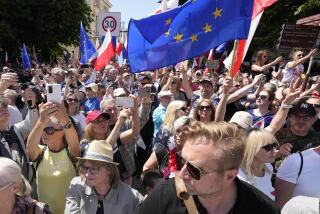Gorbachev, in Warsaw, Hears Pleas for Intellectual Liberty
- Share via
WARSAW — An assembly of Polish intellectuals Thursday made strong and sometimes emotional appeals for freedom in the arts and religion to Soviet leader Mikhail S. Gorbachev.
In a two-hour meeting with about 300 members of Poland’s intellectual establishment, held in the ornate restored ballroom of Warsaw’s royal castle, Gorbachev declined to respond to most of the comments and questions. He said he will provide detailed answers in a book to be published later.
Wojciech Zukrowski, head of the official Polish Writers Union (the Polish chapter of PEN, the international writers group, has been banned here), told Gorbachev that freedom to publish books that are now banned would fill in the controversial historical “blank spots” in Soviet-Polish relations, now the subject of joint study by historians.
“If politicians do not do harm to socialism,” Zukrowski said, “then writers certainly will not hurt it.”
He added, “The problems lie with publishers who want to print only safe books.”
Janusz Kuczynski, a philosopher, told Gorbachev that the Communist doctrine that defines religion as “the opiate of the masses” should be re-evaluated. Gorbachev nodded, but he did not verbally respond.
The gathering included Polish film makers, scientists, critics, editors and musicians. Among them were conductor Krzysztof Penderecki, film maker Krzysztof Zanussi and a handful of moderate supporters of the Polish opposition movement, including Machin Krul, publisher of Poland’s only officially sanctioned private magazine, and Andrzej Stelmachowski, head of Warsaw’s Catholic Intellectual Club.
Physicist Jan Rychlewski, after describing the difficult conditions under which Polish scientists work, brought up a topic that he said “I ought not mention.”
“In the name of my family, in the name of my community, I would like to thank the 19th Communist Party Conference (held two weeks ago) for the decision to erect in Moscow the monument to the victims of repression (by Soviet dictator Josef Stalin),” he said.
“Among those victims was also my father, a Polish patriot and a Polish Communist. We do not know where his grave is. But now we will treat this monument as his grave. We will have a place to lay flowers.”
Rychlewski said his father was executed in a Stalinist purge of the Polish Communist Party in the 1930s.
More to Read
Sign up for Essential California
The most important California stories and recommendations in your inbox every morning.
You may occasionally receive promotional content from the Los Angeles Times.










